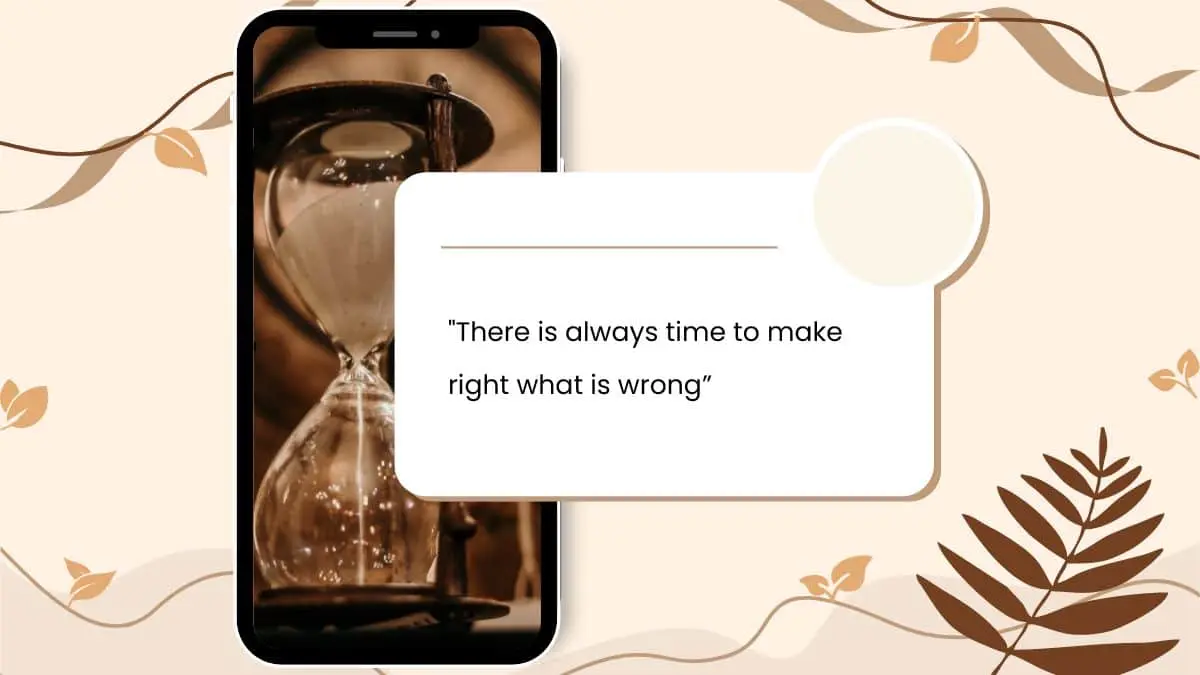The timeless adage “There is always time to make right what is wrong” serves as a powerful reminder of the human capacity for redemption and the importance of taking action to rectify our mistakes. This concept resonates across various facets of life, from personal relationships to societal injustices, underscoring the belief that it’s never too late to correct our wrongdoings and work towards a more just and equitable world. This article delves into the significance of this quote, exploring its implications in personal growth, ethical behavior, and societal change. By examining the ways in which individuals and communities can embrace this philosophy, we uncover the transformative potential that lies in acknowledging our faults and striving for improvement.
Personal Growth and Responsibility
At the heart of personal development lies the ability to recognize one’s mistakes and learn from them. “There is always time to make right what is wrong” emphasizes the importance of self-reflection and the ongoing journey towards becoming better versions of ourselves. This process involves a deep understanding of our actions and their impacts on others, followed by a commitment to making amends and preventing similar mistakes in the future.
Accepting Responsibility: Acknowledging one’s errors is the first step towards rectification. It requires humility and courage to admit when we are wrong, paving the way for genuine personal growth.
Making Amends: Once we recognize our mistakes, it’s crucial to take proactive steps to rectify them. This might involve apologizing to those we’ve hurt, seeking to repair damaged relationships, or making restitution for any harm caused.
Learning and Growth: The ultimate goal of acknowledging and rectifying our mistakes is to learn from them. Each error presents an opportunity for growth, enabling us to make more informed and ethical decisions in the future.

Ethical Behavior and Social Responsibility
The concept of making right what is wrong extends beyond personal development to encompass our behavior as members of a larger community. It highlights the importance of ethical behavior and social responsibility, urging individuals and organizations to act in ways that promote fairness, justice, and the well-being of society.
Ethical Decision-Making: Ethical behavior involves making choices that are not only beneficial to oneself but also consider the welfare of others. It requires a commitment to principles such as honesty, integrity, and respect for others.
Social Responsibility: Individuals and organizations have a responsibility to contribute positively to society. This includes addressing social injustices, engaging in charitable activities, and working towards sustainable environmental practices.
Collective Action: Making right what is wrong on a societal level often requires collective action. This can include participating in social movements, advocating for policy changes, or supporting organizations that work towards societal betterment.
The Power of Redemption and Societal Change
The belief that it is always possible to correct our wrongs holds immense power for driving societal change. It inspires hope and motivates action, encouraging individuals and communities to work together towards creating a more just and equitable world.
Redemption: The concept of redemption is central to the idea of making right what is wrong. It suggests that no person is beyond the possibility of change and that through effort and intention, individuals can overcome past mistakes.
Societal Change: By embracing the philosophy of rectifying wrongs, societies can move towards greater justice and equity. This involves addressing historical injustices, reforming systems of inequality, and creating inclusive communities where everyone has the opportunity to thrive.
Future Generations: Making right what is wrong also involves a responsibility to future generations. By correcting the mistakes of the past and present, we can leave a better world for those who come after us.
Conclusion
The maxim “There is always time to make right what is wrong” holds profound wisdom for personal growth, ethical behavior, and societal change. It challenges us to confront our mistakes, take responsibility for our actions, and dedicate ourselves to making amends. In doing so, we not only improve our own lives but also contribute to the creation of a more just and compassionate world. This timeless principle serves as a beacon of hope and motivation, reminding us that regardless of the past, the future holds limitless potential for redemption and positive transformation.
Also Read: The problem is not the problem. The problem is your attitude about the problem. Do you understand?









